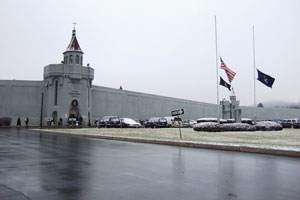This year is the 45th anniversary of the Attica prison uprising. The most notorious prison riot in American history led to 43 deaths of prisoners and guards and triggered a demand for prison reform. A recent New York Times story reports that prison conditions improved after the uprising, although some of the reforms promised in 1971 have never been implemented or have been rolled back.
There are few heroes in the story of the Attica riot. One person who deserves to be remembered for his heroism is Dr. John Edland, the medical examiner of Monroe County, New York. Pressured to support the lies told by prison authorities and other state government officials, Dr. Edlund stood up for the truth. He paid a heavy price for his unwavering honesty as an expert witness, but he never lost his integrity.
The Attica Riot
About half of the 2,200 inmates in the overcrowded Attica prison took 38 guards hostage on September 9, 1971. The inmates presented prison authorities with a list of demands. They wanted more than one shower per week and more than one roll of toilet paper per month. They wanted an end to routine beatings by prison guards and to solitary confinement in cells where they were forced to sleep naked on a concrete floor. They wanted prison officials to recognize their right to practice religions other than Christianity.
Prison officials agreed to bring in outside observers to tell the inmates’ story. The officials also agreed to many of the prisoners’ demands, although they would not agree to grant amnesty to inmates who were involved in the riot.
Four days after the uprising began, Gov. Nelson Rockefeller ordered more than 200 armed troopers to storm the prison. In the violence that followed, 39 people were shot to death, including 10 prison employees. Four people had died earlier.
The Attempted Cover-Up
State officials tried to blame the deaths of hostages on prisoners. Officials told the press that prisoners had slashed the throats of the prison employees.
When Dr. Edland autopsied the dead, it was apparent that the hostages had died from gunshot wounds, not from knife wounds. Since the prisoners had no guns, Dr. Edland’s findings compelled the conclusion that the hostages were killed by the state troopers’ gunfire.
State officials attempted to undermine Dr. Edland’s autopsy report. Immediately after Dr. Edland finished his autopsy, the Corrections Department issued a statement claiming that eyewitnesses had seen the victims’ throats being slashed.
The governor issued a statement after the autopsy claiming that the hostages had been killed by inmates. Police officers who watched Dr. Edland remove bullets from the hostages’ bodies said nothing to contradict the official story. State officials also told the families of the deceased victims that inmates had cut the victims’ throats.
Attacks on Dr. Edland
In response to the misrepresentation of his autopsy results, Dr. Edlund sought the advice of clergy. He then released his autopsy report to the media so that the truth would be made public.
Fearing that Dr. Edland would be an effective witness for families of the hostages, state officials began a campaign to damage his credibility. The state police found two local undertakers who were willing to support the claim that the hostages had died from knife wounds rather than gunshots.
The attacks on Dr. Edland resonated with members of the public who assumed that prisoners, rather than the police, had been responsible for killing the hostages. Dr. Edland began to receive threatening calls that accused him of being a Communist and siding with the inmates.
As a respected medical examiner, Dr. Edland had dedicated himself to finding the true cause of death in every case. When called upon to do so, he testified to the facts as he knew them. He could not believe that his integrity and reputation were suddenly under attack. According to his wife, Dr. Edland “was shocked that people wouldn’t believe him. Until that time, people always believed him.”
Dr. Edland’s Work as an Expert Witness
Other medical examiners who examined the bodies rallied to Dr. Edland’s defense. New York City’s medical examiner confirmed Dr. Edland’s findings, noting that “passions sometimes overtake truth and justice.” Days later, the State Correction Commissioner was forced to admit that the hostages died of gunshot wounds and not of slashed throats.
Dr. Edland testified about his autopsy results in several trials that followed the Attica riots. He always told the truth, but he continued to received threatening phone calls from misguided individuals who thought he was betraying the police by refusing to support the claim that the hostages were killed by knife-wielding prisoners.
Dr. Edland’s family recalls how he became dispirited after facing public scorn simply because he was an honest witness. He suffered a breakdown and was hospitalized for severe depression.
After his discharge, Dr. Edland resigned from his position as medical examiner. He joined the faculty of Vanderbilt University and later became a dean at Creighton University in Omaha.
Until his death in 1991, Dr. Edland continued to testify as an expert witness, but in criminal cases, he only testified for the defense. He told the press that he was “no longer interested in the state’s case because it seems they have so much power” compared to “the poor little guy on the other end.”
Dr. Edland stands as a model for all expert witnesses. Trials are a search for the truth. Experts serve a crucial role in helping juries find the truth, but only if their testimony is honest. Sometimes serving the cause of truth is difficult, but expert witnesses who do so in the face of adversity, like Dr. Edland, are among the heroes of the judicial system.
Image Credit: By Jayu from Harrisburg, PA, U.S.A. (Attica, New York (Correctional Facility)) [CC BY-SA 2.0], via Wikimedia Commons




